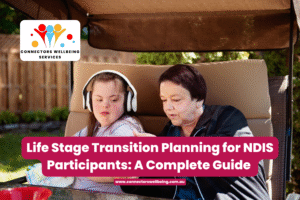The concept of NDIS support can be quite confusing in the areas of Respite care and Short-Term Accommodation (STA). This is the main question many of the participants and their families ask about the difference between respite and Short-Term Accommodation, what each service provides, and how to receive them.
What Does Short-Term Accommodation Mean in the NDIS?
Short-Term Accommodation (STA) under the NDIS refers to a transitional provision of accommodation to participants in cases where their regular carer is inaccessible. It helps in daily living, personal care, and socialization so that the participants can feel safe, comfortable, and active throughout their stay.
STA also promotes independence and wellbeing. The participants are allowed to spend the night, weekend, or a short break depending on the NDIS plan. The plan provides the funding and thus participants do not pay out of pocket where arrangements have been made through the approved providers.
Understanding Short-Term Accommodation (STA)
STA gives participants choice and flexibility. STA is centered around the experience of the participant, as opposed to respite which mostly serves to assist the carers. Participants also learn through the day-to-day routines, engage in skills development, and participate in social or recreation activities in a supervised and secure setting during a stay.
The length of STA depends on the plan. NDIS specifies the maximum STA under NDIS and how often it can be used. Providers deliver personalised, participant-focused support that builds confidence, independence, and wellbeing during every stay.
Purpose of Short-Term Accommodation
The main purpose of STA is to:
- Provide a safe, supported place for NDIS participants while carers are unavailable
- Offer skill development and social engagement opportunities
- Maintain mental and physical health through discipline.
- Provide families with a sense of security that their loved one is taken care of in a professional environment.
These benefits make STA help participants live better, more independent, and confident.
NDIS Respite Care vs STA: Key Differences
The difference between respite and Short-Term Accommodation is an essential part of selecting the appropriate service. Although they could be used temporarily, their scope and presentation are different:
| Feature | Respite Care | Short-Term Accommodation (STA) |
| Location | Home, community, or accommodation | Residential facility or approved STA property |
| Purpose | Break for carers | Supported independent living for participants |
| Duration | Short periods, flexible | Usually scheduled stays (overnight or longer) |
| Focus | Relief for carers | Participant wellbeing, skills, and independence |
| Funding | NDIS-funded respite | NDIS-funded STA |
In short, respite care primarily supports the carer, while STA is designed around the participant’s experience and independence.
How Long Can You Stay in STA?
The length of the STA will depend on the needs and funding of the participant. Most stays are short-term, ranging from a single night to several weeks. The NDIS plan outlines the maximum STA under NDIS, eliminating cases where the participant is given more support than the allocated funding.
One example is that a participant could stay overnight on a weekly basis to build their skills or have carers on holidays that are much longer. Being flexible is important and STA can be structured to accommodate both participants and families.
Does NDIS Pay for Respite?
Yes, NDIS funding can cover both NDIS-funded respite and STA. Respite funds are provided as part of a participant plan, which allows carers to get a temporary break without the worry of incurring financial expenses. You need to know your plan, how many hours are authorized, and how you can use the funding to support various types of backups.
NDIS short breaks or STA stays are also funded under the plan. You can discuss with your NDIS support coordinator or provider to ensure the right service is booked for your needs.
Types of STA and Respite Services
Participants can access a variety of temporary accommodation NDIS options depending on their needs:
- In-home respite: Services are offered at the home of the participant
- Community-based respite: Short stays in community centers or day programs
- Residential STA: Overnight stays in specialised accommodation with trained staff
- Short breaks: Brief durations of a couple of hours to a couple of nights.
Both options have specific advantages as participants and carers can choose the best way to support a situation.
STA for NDIS Participants: What You Need to Know
STA is not just a break; it’s an opportunity for participants to develop skills and independence. During a stay, participants may:
- Practice daily living skills such as cooking, cleaning, or personal care
- Engage in social and recreational activities
- Build confidence in managing routines away from their usual home environment
It’s also a safe and structured way for participants to experience temporary accommodation NDIS, preparing them for greater independence if desired in the future.
Tips for Choosing the Right STA or Respite Provider
In choosing a provider of STA NDIS or respite care, remember these tips:
- Check credentials: Check that the provider is registered and has trained personnel with NDIS
- Facility visits: Provided possible, visit the accommodation to get an actual feel of the environment
- Review feedback: Read reviews and speak to other families for experiences
- Match participant needs: Select services according to personal objectives, interests, and assistance needs
- Clarify funding: Make sure that you know what is included in your plan and any out-of-pocket expenses
Conducting research is a guaranteed positive experience for both the participants and carers.
Conclusion
Understanding the difference between respite and Short-Term Accommodation helps families and participants in making wise decisions. Respite is about giving the carers some time off whereas STA offers its participants independence, skills training and a secure environment to live. Both are critical NDIS wellbeing and quality of life supports.
Connectors Wellbeing may assist you or your loved one in seeking reliable STA NDIS or respite services in Darwin. Our qualified team helps NDIS participants with short-term accommodation and respite care that is comfortable, safe, and individualized.
Contact Connectors Wellbeing today to discuss your NDIS plan and book STA or respite services that meet your needs.





